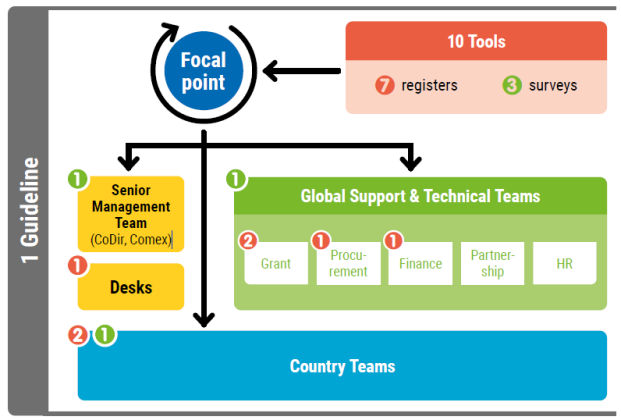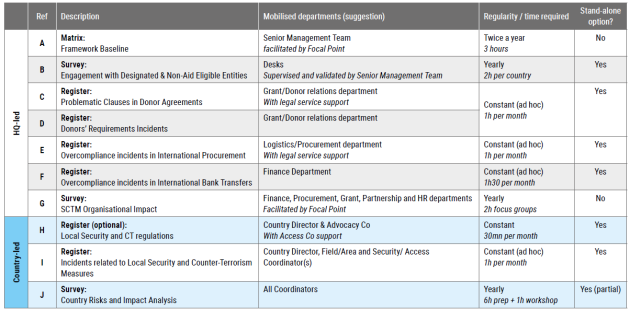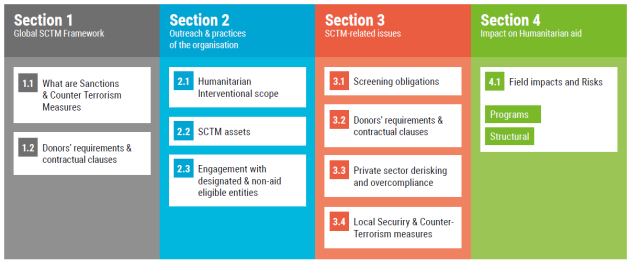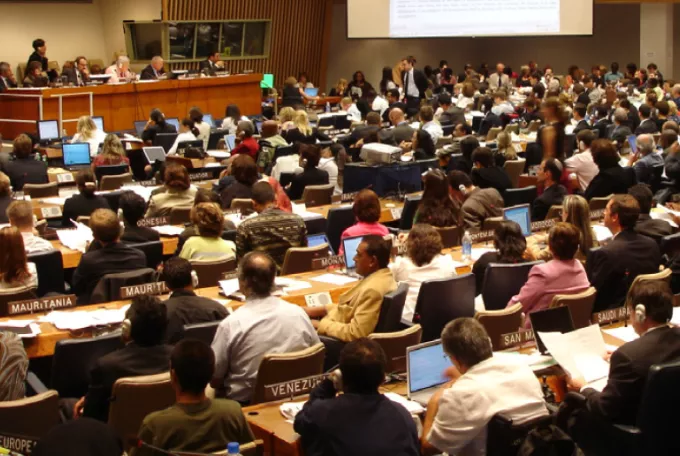The impacts of sanctions and counterterrorism measures: Data collection toolkit
2. How to use the framework
Framework contents
These guidelines should be your first reading material. They provide all the necessary background information on the scope of SCTM, the
operational issues and concrete impacts they bring to organisations. Additionally, they explain the best approach to collecting information about SCTM. Depending on your department and position, the orientation table below will indicate which section you should specifically pay attention to.
A set of 10 data collection tools, comprising registers and surveys, has been designed for internal dissemination. Prior to deployment, these tools will be tailored to align with the organisation's operational practices with the support of the designated Focal Point (FP). Following adaptation, these tools will be accessible and utilised by all designated departments and their respective Persons of Reference. For further details regarding the specific tool you will be engaged with, refer to the Tools chapter and orientation table below.

Utilising the Tools on a standalone basis
Although the methodology of this data collection framework is crafted for comprehensive implementation within an organisation, all embedded registers can be used independently. Any organisation interested in a trial, or specific departments and country offices that prefer selective usage, can do so. Tools viable for isolated use are highlighted in yellow in the preceding chart and enumerated in the 'Tools Overview' chapter.
The full process
This data collection framework requires the mobilisation of several departments and organisational layers, with a primary focus on
utilising information available at Headquarters.
- The process starts with an official kick-off led by the Senior Management Team (SMT or Board of Directors) and Desks/Regional Directions. This phase involves prioritising tools and initiating the collection of initial information, facilitated by the Focal Point (FP).
- The selected tools (registers) will subsequently be shared with relevant Global (HQ) Support and Teams responsible for addressing technical SCTM issues. These tools will be employed throughout the year to gather pertinent data. The process will culminate in an organisational impact survey, facilitated by the FP.
Following an initial global analysis by the FP, Country Teams will subsequently be engaged. This will entail utilising a local SCTM issues register and analysing the residual impact of SCTM on humanitarian aid.

The focal point (FP) refers to an individual designated within organisations that choose to implement this data collection framework. The FP is responsible for customising and executing the comprehensive framework within the organisation. It's important to note that the FP might have additional responsibilities beyond this project and could hold other positions, such as an advocacy manager or director's assistant. The FP adjusts the toolset and its roll-out strategy according to the priorities of the SMT, provides assistance to relevant departments when needed, and oversees the analysis of all collected data sets.
Tools overview

Guidelines overview
To better understand the complexities of SCTM and their effects, these guidelines follow a causal structure through 4 different sections. This structure delineates the progression from the normative framework encompassing sanctions, laws, and measures, through the specific issues they generate for a humanitarian organisation, and culminating in their final impact on aid delivery.
For a visual representation of the hierarchy of sections and subsections, please refer to the chart below:

Key definitions
Bank de-risking occurs when banks refuse to offer services, such as accounts or transfers, to organisations or locations perceived as high risk in order to minimise their own exposure to accusations of facilitating terrorist financing, which could result in fines or other repercussions.
Chilling Effect refers, in this context, to the phenomenon arising when humanitarian organisations opt to withhold assistance in specific
areas controlled by Designated Terrorist Groups (DTG) or sanctioned actors. Even though interaction with DTGs is not forbidden by International Humanitarian Law (IHL) or any existing donor country counterterrorism clauses, the ambiguity experienced by humanitarian actors may provoke over-self-regulation. Consequently, organisations might abstain from delivering aid in regions where affected populations are in need, stemming from a cautious approach to avoid potential legal and reputational ramifications.
Counter-terrorism measures: These are actions and policies put in place by governments, international and regional organisations, and
institutional donors to fight terrorism, including its funding. They can take the form of laws (international sanctions, criminal code, specific legislations, etc.) but also policies.
Derogation: A derogation refers to the process whereby an organisation requests the non-applicability of specific obligations or
restrictions for their own business. Concretely, for a humanitarian organisation, it means that after having sign a contract with a donor to implement a humanitarian project in areas affected by a restrictive measure, the organisation will need to apply for a derogation to receive a specific authorisation for instance for the transfer of specific items in a country under sanctions. Derogation processes are different from a State to another. Among humanitarian actors, there is a widespread scepticism around derogation processes: it is often considered as an additional and non-efficient administrative burden, as derogation systems vastly differ from one sanction regime to another.
Designated Entities or Groups, organisations and individuals designated as “terrorists”: These are entities designated as "terrorist" by a State under its national law or by an international organisation under international law. The criteria for designating a group, organisation or individual as "terrorist" vary from country to country. Designation as a "terrorist" may have legal implications, including sanctions, bans and restrictions (asset freezes, travel bans, etc.).
Dual-use items: products and technologies that have the potential for both civilian and military applications. While they are designed for general use, dual-use items can also be employed in military operations or in the creation of military systems. In a regulatory context, the export and transfer of dual-use items often require specific controls and approvals due to the potential implications for national and international security.
Due diligence generally refers in this context to the assessment and management of potential risks and ethical considerations when establishing and maintaining partnerships in a humanitarian context. It involves scrutinising partners for compliance with legal, ethical, and humanitarian standards, and implementing practices to ensure that collaborative efforts align with the guiding
principles and regulatory frameworks of humanitarian work. Additionally, within these guidelines, due diligence also encompasses the
precautionary measures taken by third-party entities from the private sector (such as banks and suppliers) or donors to evaluate the risks posed by some of their clients and operational partners.
Extraterritoriality refers to the application and enforcement of one country's sanctions laws and regulations beyond its own territorial borders. This usually involves penalising entities (such as companies or individuals) in third countries for engaging in trade or other activities with a sanctioned country or entity. The implementing country seeks to deter and control specified behaviours or activities, not just within its borders, but globally, often affecting international businesses and relations. One well-known example is the United States enforcing certain sanctions laws on non-U.S. entities conducting business with sanctioned countries like Iran, even if those entities have limited connections to the U.S.
Humanitarian exemption / Exception / Carveout: A humanitarian exemption aims to free humanitarian organisations and their staff from the obligations imposed by sanctions regimes and counter-terrorism measures that could hinder their work. Humanitarian exemptions create a space for principled NGOs to work without the risk of contravening these regimes. In some documents, humanitarian exemption is also called exception or carveout.
Non-aid eligible entities: This term is considered alongside 'designated entities' and refers to entities that, despite not being listed on any sanctions or counter-terrorism designation lists, should not receive any benefits from humanitarian aid, whether direct or indirect, intentional or unintentional. It encapsulates those organisations, individuals or institutions that are determined to be ineligible for aid support, based on certain predefined criteria or judgements, to safeguard the integrity and objectives of humanitarian assistance.
This may include, but is not limited to, national or regional authorities, non-designated armed groups, official military bodies, and individuals holding power over humanitarian action, etc.
Overcompliance encompasses all risk limitation practices, including due diligence precautions, that go beyond what is strictly necessary or required by the SCTM normative framework. Deterring actions may include practices such as “cumbersome, onerous documentation or certification, charging higher rates […] or imposing discouraging long delays”
Restrictive measures / Sanction regime: A restrictive measure or a sanction regime is a set of coercive measures taken by an international organisation or a government (these are referred to as unilateral sanctions), or by a coalition of States to exert economic, political or diplomatic pressure on a specific country, group, organisation or individual at international, regional or national levels. They
can include various measures such as economic sanctions, (asset freezing, arms embargoes, etc.), diplomatic sanctions (breaking off diplomatic relations or bilateral negotiations, etc.) or individual sanctions against individuals or entities designated as “terrorists” (travel or entry bans, asset freezes, etc.). Some sanctions derive from the fight against terrorism (e.g. UNSC Resolution 1267).
Sanctions and Counter-Terrorism Measures (SCTM): Within the context of this framework and to allow seamless comprehension and
appropriation, the term SCTM has been introduced as a collective descriptor. It amalgamates both 'sanction regimes' and 'counter-terrorism measures' into a singular term and acronym, intending to streamline discussions and analyses in contexts where these regulatory frameworks intersect or operate in tandem.
Screening: It refers to the action of checking the identity of a person against a sanctions list to determine if the person is designated by a sanction or a counter-terrorism measure.
Vetting: This goes further than screening, since it can include deeper background checks on specific individuals (normally including screening against sanction lists but not only) that could raise additional concerns regarding data protection and data sharing. Those background checks can be done by donors based on information shared by the subcontractor or by the subcontractor itself.
The data collection tool was developed and designed by Action Against Hunger, Médecins du Monde, and Humanity & Inclusion.

